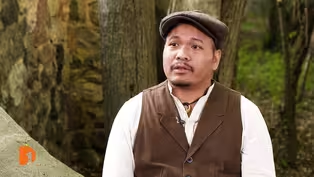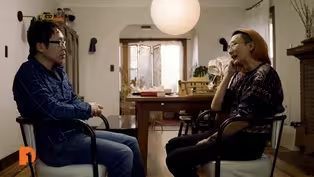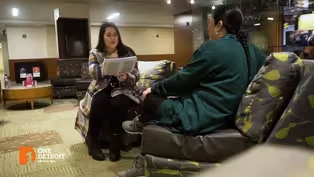
Kyunghee Kim & Leo Chen’s shifting Asian American identities
Clip: Season 8 Episode 46 | 5m 43sVideo has Closed Captions
Kyunghee Kim and Leo Chen have a conversation for One Detroit’s AAPI Stories Series.
Ypsilanti couple Kyunghee Kim and Leo Chen join One Detroit's AAPI Stories Series to talk about how their Asian American identities have shifted over the years and they also describe their versions of the Asian American dream. In this installment of their story, Kim and Chen recall immigrating to the United States as children and how different their experiences were.
Problems playing video? | Closed Captioning Feedback
Problems playing video? | Closed Captioning Feedback
One Detroit is a local public television program presented by Detroit PBS

Kyunghee Kim & Leo Chen’s shifting Asian American identities
Clip: Season 8 Episode 46 | 5m 43sVideo has Closed Captions
Ypsilanti couple Kyunghee Kim and Leo Chen join One Detroit's AAPI Stories Series to talk about how their Asian American identities have shifted over the years and they also describe their versions of the Asian American dream. In this installment of their story, Kim and Chen recall immigrating to the United States as children and how different their experiences were.
Problems playing video? | Closed Captioning Feedback
How to Watch One Detroit
One Detroit is available to stream on pbs.org and the free PBS App, available on iPhone, Apple TV, Android TV, Android smartphones, Amazon Fire TV, Amazon Fire Tablet, Roku, Samsung Smart TV, and Vizio.
Providing Support for PBS.org
Learn Moreabout PBS online sponsorship(serene music) - I think, you know, where you were going initially is that the immigration piece, you know, when you came over, when your parents immigrated over here, how old were you?
What was that like?
- I was eight years old, and my sister was six.
It was 1988, and it was very hard because it was, like, three days before Halloween.
And so Halloween happened and my sister and I were like, "What is happening?"
People were dressed up.
People were knocking on our doors trying to get candy.
We don't have any candy.
It was really terrifying and fascinating at the same time.
That's my core memory of moving to the US, and perhaps my feeling throughout, like how terrifying but how fascinating as well.
And I know you have kind of a different experience because you were three, so I don't know how much you remember, right?
- Yeah, so it's completely different than yours.
I feel that at age eight for you, it was a lot.
You were more observant.
You were more aware of your surroundings and just the difference of where you were before, South Korea and then coming to Michigan.
And so for me, I was three, but my parents had left me in Taiwan actually, so my grandma- - Which I did not even know until a couple years ago.
I guess I just assume that when any family comes to America that they just come with their family.
So it didn't dawn on me that, oh, your parents came without you.
It boggled my mind.
- You know, that's just culturally, that's something that everyone did back then in the eighties.
All of them came over to study, grad school, either master's or my dad getting his PhD.
And so I think during that time they were trying to survive.
They came over and they just thought, "Well, it's better for my dad's mom to take care of me "for the next three years."
And so I actually never met my father until I came.
And so I just remember my grandma taking me to Tennessee.
That's where they were initially 'cause they both went to Middle Tennessee University.
And so, first time meeting my dad was shocking, you know?
'Cause I just remember my grandma saying, "This is your dad," you know?
And I just stood there, and I think what won me over, really, was he bought all these toys and then he also bought candy.
And it was just so easy to just give my heart over.
The other shocking part was then my grandma left.
I just remember she came and then she left.
So I think that's something that I have not really reflected on until really more in these years, in my adult years, just as how tragic that was to be with someone for three years and then, all of a sudden, that someone who was safe, someone that I knew and and loved was gone.
With your parents, why did they come to the us?
- I didn't know for the longest time.
And so when I hear your story and even stories of our friends, many of them was their parents studied, came here to study, and I didn't know for a very long time, and I don't know if I wasn't curious or if I wasn't allowed to ask, but I never asked my parents until maybe, I don't know, five, 10 years ago or something like that.
So my dad was a huge accountant in Korea and worked at a big bank and did really well.
But he was tired of that work.
I mean, work culture in Korea is very toxic, and so he wanted something different, so he did a clothing business with my mom.
My mom was a stay at home mom, and that didn't go well.
And so my mom already had family here in America, her sisters, her mom even, and so my mom just thought, "Okay, we need to go to America if we wanna start over, right?"
And so it was coupled with that and then thinking about us, my sister and I and our future and what we could have, they thought, "Okay, this is the best decision."
So they literally went bankrupt from their clothing business, had no money, and just came to America, Michigan, because that's where all of her siblings were at, and we lived with my uncle who is my mom's youngest brother.
We lived with my uncle and his family for a little bit.
So that's why.
I think they just wanted to, or not wanted, but needed to start over and was maybe sort of thinking that, "Okay, this life in Korea is not going to work for us "or for our daughters."
- [Leo] Hmm.
I see.
Dan Moen on growing up as a Filipino adoptee in Romeo
Video has Closed Captions
Clip: S8 Ep46 | 4m 11s | Dan Moen, an adoptee from the Philippines, shares his experience growing up in Romeo. (4m 11s)
Jack Cheng and Paul Pham unpack what home really means
Video has Closed Captions
Clip: S8 Ep46 | 3m 54s | Asian American friends Jack Cheng and Paul Pham share the common threads that connect them. (3m 54s)
Two women bond through AAPI advocacy, APA Studies Class
Video has Closed Captions
Clip: S8 Ep46 | 7m 43s | Two women create a lasting bond through AAPI Advocacy and an APA Studies class at MSU. (7m 43s)
Providing Support for PBS.org
Learn Moreabout PBS online sponsorship
- News and Public Affairs

Top journalists deliver compelling original analysis of the hour's headlines.

- News and Public Affairs

FRONTLINE is investigative journalism that questions, explains and changes our world.












Support for PBS provided by:
One Detroit is a local public television program presented by Detroit PBS


